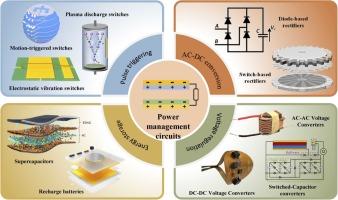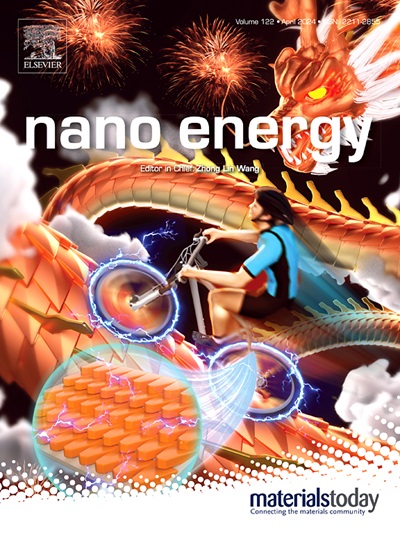Efficient electrical energy conversion strategies from triboelectric nanogenerators to practical applications: A review
IF 16.8
1区 材料科学
Q1 CHEMISTRY, PHYSICAL
引用次数: 0
Abstract
Triboelectric nanogenerators (TENGs) have emerged as a promising energy-harvesting technology that can efficiently convert ambient mechanical energy into electricity. Compared to traditional electromagnetic generators, TENGs offer advantages such as high power density, low cost, material flexibility, and simple fabrication, demonstrating broad application prospects in self-powered sensors, wearable devices, and biomedical systems. However, the mismatch between the output electrical energy of TENGs (alternating current, high voltage, low current) and the requirements of most electronic devices (direct current, constant voltage) often limits their practical application. To enhance the energy conversion efficiency of TENGs in real-world applications, researchers have developed various efficient energy conversion circuits and implementation strategies. This paper provides a comprehensive overview of advanced strategies for achieving pulse triggering, AC–DC conversion, voltage regulation, and energy storage, covering the entire process of TENG electrical energy conversion. In addition, several efficient TENG energy conversion circuits are presented for different application scenarios. Finally, the challenges and future directions of TENG energy conversion circuit design are discussed, aiming to provide a reference for designing more efficient TENG energy conversion systems.

从三电纳米发电机到实际应用的高效电能转换策略:综述
三电纳米发电机(TENGs)是一种前景广阔的能量收集技术,可以有效地将环境机械能转化为电能。与传统电磁发电机相比,三电纳米发电机具有功率密度高、成本低、材料灵活、制造简单等优点,在自供电传感器、可穿戴设备和生物医学系统中具有广阔的应用前景。然而,TENG 的输出电能(交流电、高电压、低电流)与大多数电子设备的要求(直流电、恒压)之间的不匹配往往限制了其实际应用。为了提高 TENG 在实际应用中的能量转换效率,研究人员开发了各种高效能量转换电路和实施策略。本文全面概述了实现脉冲触发、交直流转换、电压调节和能量存储的先进策略,涵盖了 TENG 电能转换的整个过程。此外,还介绍了几种针对不同应用场景的高效 TENG 能量转换电路。最后,讨论了 TENG 能量转换电路设计的挑战和未来方向,旨在为设计更高效的 TENG 能量转换系统提供参考。
本文章由计算机程序翻译,如有差异,请以英文原文为准。
求助全文
约1分钟内获得全文
求助全文
来源期刊

Nano Energy
CHEMISTRY, PHYSICAL-NANOSCIENCE & NANOTECHNOLOGY
CiteScore
30.30
自引率
7.40%
发文量
1207
审稿时长
23 days
期刊介绍:
Nano Energy is a multidisciplinary, rapid-publication forum of original peer-reviewed contributions on the science and engineering of nanomaterials and nanodevices used in all forms of energy harvesting, conversion, storage, utilization and policy. Through its mixture of articles, reviews, communications, research news, and information on key developments, Nano Energy provides a comprehensive coverage of this exciting and dynamic field which joins nanoscience and nanotechnology with energy science. The journal is relevant to all those who are interested in nanomaterials solutions to the energy problem.
Nano Energy publishes original experimental and theoretical research on all aspects of energy-related research which utilizes nanomaterials and nanotechnology. Manuscripts of four types are considered: review articles which inform readers of the latest research and advances in energy science; rapid communications which feature exciting research breakthroughs in the field; full-length articles which report comprehensive research developments; and news and opinions which comment on topical issues or express views on the developments in related fields.
 求助内容:
求助内容: 应助结果提醒方式:
应助结果提醒方式:


